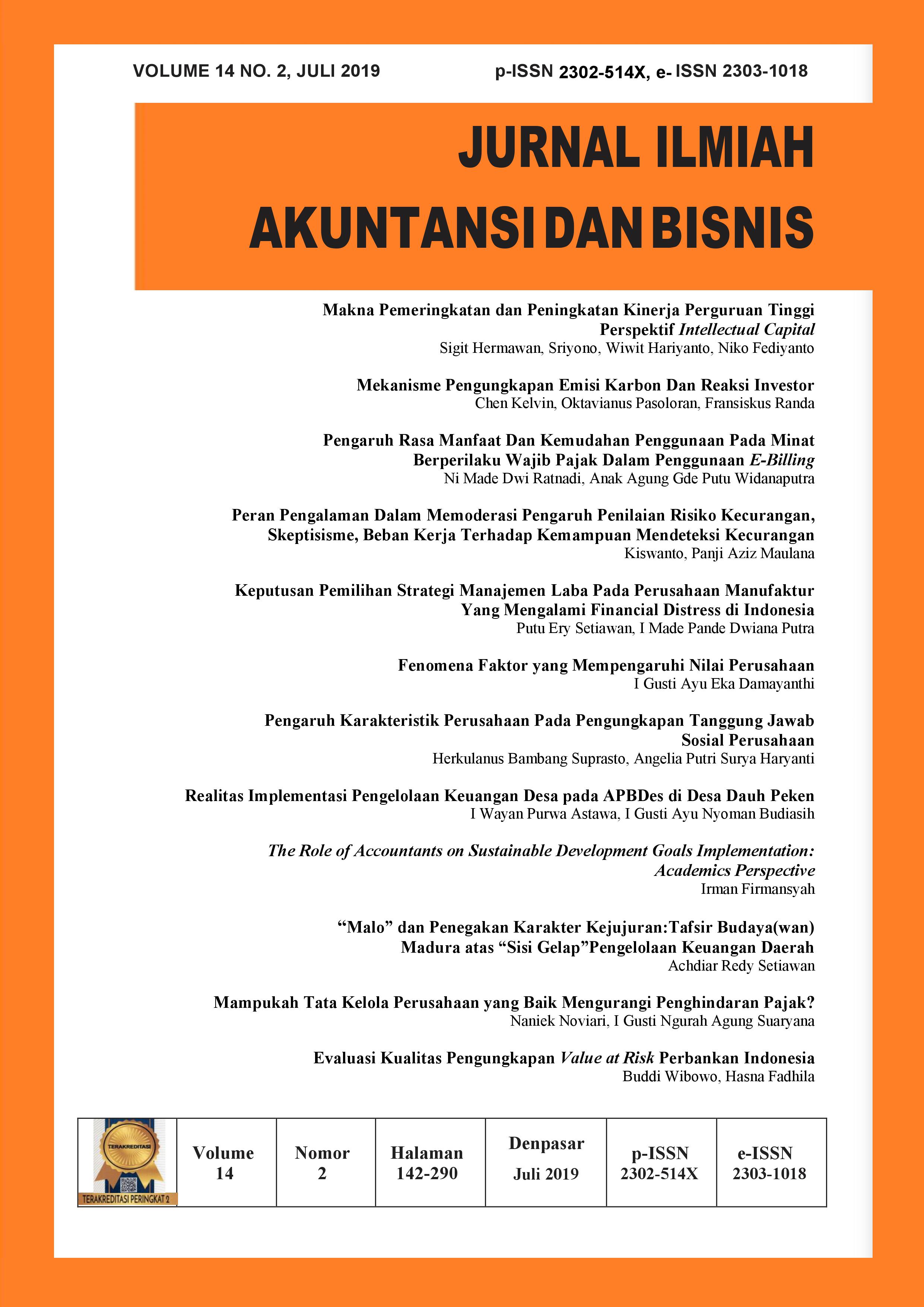Mampukah Tata Kelola Perusahaan Yang Baik Mengurangi Penghindaran Pajak ?
Abstract
Taxpayers will try to pay the smallest possible tax. One way to reduce taxes is to engage in tax avoidance actions commonly referred to as tax avoidance. One of the causes of this behavior is the presence of an executive character who dares to take risks. The impact of the executive character on tax resignation can be reduced by the implementation of good corporate governance. This research proposes the application of good corporate governance to reduce the impact of an executive character on aggressive tax actions. The population of this study comprises of all manufacturing companies listed on the Indonesia Stock Exchange in 2014–2016. Sampling was done using purposive sampling. 48 observations were picked as the samples. This study involved one independent variable (executive characteristics), one dependent variable (aggressive tax action), and one corporate governance variable. The study used moderated regression analysis. This study found the more aggressive the executive character, the higher the probability of the tax avoidance. Better implementation of good corporate governance results in lower the tax avoidance action. Better implementation of good corporate governance also weakens the influence of the executive character on tax avoidance actions.
Keywords: tax avoidance, executive characteristics, good corporate governance
Downloads
References
Carolina, Verani, Maria Natalia dan Debbianita. (2014). Karakteristik Eksekutif terhadap Tax Avoidance dengan Leverage sebagai Variabel Intervening. Jurnal Keuangan dan Perbankan, 18 (3), h:409-419.
Desai, M. A., dan Dharmapala, D. (2006). Corporate Tax Avoidance and High-powered incentives. Journal of Financial Economics 79: 145-179.
Dewi, N.K. (2013). Pengaruh Karakter Eksekutif, Karakteristik Perusahaan, dan Corporate Governance terhadap Tax Avoidance pada Industri Manufaktur yang Terdaftar di Bursa Efek Indonesia Periode 2009-2012. Skripsi. Fakultas Ekonomi dan Bisnis. Universitas Udayana Denpasar.
Dyreng, S., M. Hanlon, and E. Maydew. (2008). Long Run Corporate Tax Avoidance. The Accounting Review 83(1), pp 61-82.
FCGI. (2001). Seri Tata Kelola Perusahaan (Corporate Governance) Jilid II “Peranan Dewan Komisaris dan Komite Audit dalam Pelaksanaan Corporate Governance (Tata Kelola Perusahaan)”. Jakarta: FCGI.
Ghozali, Imam. (2016). Aplikasi Analisis Multivariate dengan Program IBM SPSS23. Semarang:Badan Penerbit Universitas Diponogoro.
Hartono, Jogiyanto. (2013). Teori Portofolio dan Analisis Investasi. Yogyakarta: BPFE.
Irawan, H. P. (2012). Pengaruh Kompensasi Manajemen dan Corporate Governance terhadap Manajemen Pajak Perusahaan. Fakultas Ekonomi. Universitas Indonesia.
Kaihatu, T.S. (2006). Jurnal Manajemen Dan Kewirausahaan, Vol.8, No. 1, hal. 1-9
Kholbadalov, Utkir. (2012). The Relationship of Corporate Tax Avoidance, Cost of debt and Institutional Ownership: Evidence from Malaysia. Atlantic Review of Economics, 2, pp:1-36.
Komite Nasional Kebijakan Governance. (2006). Pedoman Umum Tata kelola Perusahaan yang Baik Indonesia.
Low, Angie. (2006). Managerial Risk-Taking Behaviour and Equity-Based Compensation. Fisher College of Business Working Paper. SSRN 934857
Monks, R. A.G, dan Minow, N. (2003). Corporate Governance 3rd Edition. Blackwell Publishing.
Monks, Robert A.G, dan Minow, N. (2003). Corporate Governance 3rd Edition. Blackwell Publishing.
Paligorova, Teodora. (2010). Risiko perusahaan Taking and Ownership Structure. Bank of Canada Working Paper. ISSN 1701-9397.
Permatasari, I. (2014). Pengaruh Implementasi Tata kelola perusahaan yang baik terhadap Permodalan dan Kinerja Perbankan di Indonesia: Manajemen Risiko Sebagai Variabel Intervening. Jurnal Ekonomi Kuantitatif Terapan 7(1), hal.52-59.
Prasetyo, Kristian Agung. (2014). Quo Vadis Tax Ratio Indonesia?.www.bppk.go.id. Diunduh tanggal 7 Desember 2015.
Puspita, S.R. (2014). Pengaruh Tata Kelola Perusahaan terhadap Penghindaran Pajak.Fakultas Ekonomika dan Bisnis Universitas Diponegoro, Semarang.
Sari, D. K., dan Martini, D. (2010). Ownership Characteristics, Corporate Governance, and Tax Aggressiveness. The 3rd International Accounting Conference &The 2nd Doctoral Colloquium. Bali.
Sartori, N. (2009). Corporate Governance Dynamics and Tax Compliance.International Trade and Business Law Review. SSRN 1361895.
Simanjuntak, Dian Fransiskus dan Dahlia Sari. (2014). Peran Penghindaran Pajak dalam Mengurangi Biaya Utang dengan Efektifitas Komite Audit sebagai Variabel Moderasi. Simposium Nasional Akuntansi XVII.Mataram, Lombok.
Suardijaya, IN., L. Handayani, dan Isnaini. (2016). Tindakan Pajak Agresif Pada Perbankan: Eksplorasi Risiko perusahaan Dan Corporate Governance. Simposium Nasional Akuntansi XVII.Lampung.
Sugiyono. (2013). Metode Penelitian Bisnis (Pendekatan Kuantitatif, Kualitatif dan R&D). Bandung: Alfabeta, CV.
Zain, Mohammad. (2003). Manajemen Perpajakan. Jakarta: Salemba Empat.




















